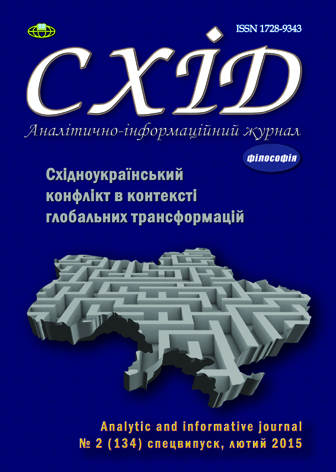Virtual aspects of war strategy in the ХХІ century
DOI:
https://doi.org/10.21847/1728-9343.2015.2(134).40183Keywords:
war, virtual, social construction, hybrid war, reality.Abstract
The present paper examines the problem of modern world military thought. In the work the author focuses attention on the virtual component in the modern conflicts. Special attention author accentuates, for the mechanisms of formation the social foundations of a successful military action in the twenty-first century.
The author pays special attention to the mechanism of formation of reality. Individually identifiable specific features relationship virtuality and war. The article shows the need for research on the theme of virtuality as a basis for social construction in the XXI century. The paper shows the philosophical foundation laid by under absolutely modern processes of virtualization. It is shown that the characteristics of virtual processes began to emerge in the late twentieth century. The author states that the processes of virtuality are key basics of any conflict of XXI century. Special relationship established between the concept of virtuality of the author and the concept of "hybrid warfare". The author gives all the logic deployment of process of virtuality to be able to show the features of the conflict in the Donbass. The author shows on the basis of virtual processes and predict the possibility of preventing similar conflicts in the future.
Finally, the author indicates philosophical roots interrelation virtuality and modern war.
References
Diogenes Laertius (1986), About life, teachings and sayings of famous philosophers, Thought, Moscow, 576 p. (rus).
Greg G. (2010), Hybrid Wars. Government Executive, 7 October, Retrieved, available at: http://www.govexec.com/magazine/features/2008/05/hybrid-wars/26799 (eng).
Gritsanov А. (2003), Newest Philosophical Dictionary, Minsk, 1280 p. (rus).
Fears R. (1981), Aufstieg und Niedergang der rmischen Welt, II.17.2, pp. 747-748. (eng). doi: 10.1515/9783110850680-006
Hobbes T. (1964), Selected Works, Vol. 1, Nauka, Moscow, 676 p. (rus).
Jaspers K. (1991), Sense and destination of history, Politizdat, Moscow, 527 p. (rus).
Schwartau W. (1996), Information Warfare: Cyberterrorism: Protecting your personal security in the electronic age, 2nd ed., Thunder's Mouth Press, 768 p. (eng).
Virilio P. (2002), Information bomb. The strategy of deception, Gnosis, Moscow, 192 p. (rus).
Levin S. M. (2011), Vestnik of Leningrad State University named after A.S. Pushkin, 3, Volume 2. Philosophy, pp. 161-170 (rus).
Khoruzhyy S. (1997), Voprosy filosofii, 6, pp. 56-74 (rus).
Leushkin R. V. (2014), Fundamentalnye issledovaniya [Basic Research], 6 (rus).
Smith B. L., Lasswell H. D. (1946), Propaganda, Communication and Public Order, Princeton, 127 p. (eng). doi: 10.1515/9781400878642
Kharchenko К. (2009), Sociology: methodology, methods, mathematical modeling, 1 (28), pp. 129-148 (rus).
Von Glaserfeld E. (1995), Radical constructivism: A way of knowing and learning, Falmer Press, London, 231 p. (eng). doi: 10.4324/9780203454220
Baksanskiy O. Ye., Kucher Ye. N. (2005), Cognitive science: from knowledge to action, KomKniga, Moscow, 184 p. (rus).
Downloads
Published
How to Cite
Issue
Section
License
Copyright (c) 2015 Oleg Kirnitіkiy

This work is licensed under a Creative Commons Attribution-NonCommercial-NoDerivatives 4.0 International License.
1. Authors bear responsibility for the accuracy of facts, quotations, numbers and names used.
2. Manuscripts are not sent back.
3. The publisher does not always agree with the authors' opinion.
4. The authors reserve the right to authorship of the work and pass the first publication right of this work to the journal under the terms of a Creative Commons Attribution Non-Commercial License, which allows others to freely distribute the published research with the obligatory reference to the authors of the original work and the first publication of the work in this journal.
5. The authors have the right to conclude separate supplement agreements that relate to non-exclusive work distribution in the form in which it has been published by the journal (for example, to upload the work to the online storage of the journal or publish it as part of a monograph), provided that the reference to the first publication of the work in this journal is included.

